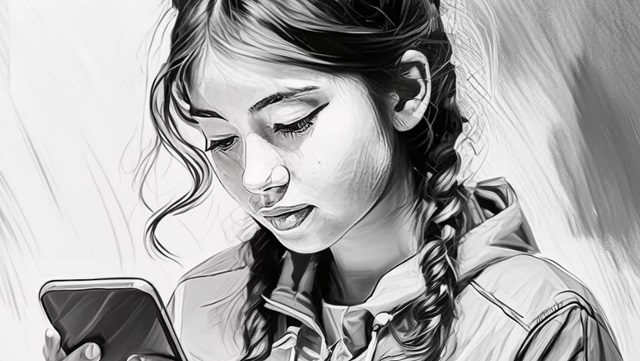BTN News: Teenagers today are more connected than ever, spending hours glued to their smartphones. But what happens when they are asked to unplug? In a bold experiment led by the BBC, ten students from Media City School in Salford, England, swapped their smartphones for basic Nokia devices, embarking on a five-day “smartphone detox.” The goal? To explore the impact of technology on their lives and well-being. The results were eye-opening, with many teens finding unexpected benefits like better sleep, deeper connections, and rediscovering hobbies. This digital detox experiment sheds light on how reducing screen time can positively impact teenagers, raising important questions about technology use and its effects on mental health.
The Smartphone Obsession: How Much Is Too Much?
In the digital age, smartphones have become a crucial part of daily life, especially for teenagers. From coordinating social plans to navigating with Google Maps and paying for daily needs, young people rely heavily on their devices. However, with this dependency comes concern. A Harvard study reveals that social media usage stimulates the same brain regions activated by addictive substances. For many teens, this translates into hours lost scrolling through TikTok or maintaining Snapstreaks on Snapchat, driven by the fear of missing out, or “FOMO.”
Digital Detox Challenge: A Bold Move by Media City School Students
To investigate the effects of reduced smartphone use, ten students at Media City School in Salford took part in a digital detox experiment. They agreed to exchange their smartphones for basic Nokia phones—capable only of making calls and sending texts. For five days, these teens were challenged to live without their usual digital tools. For Will, who spent over eight hours daily on his phone, this meant facing his fear of socializing more with his parents. Meanwhile, Ruby, an aspiring actress, found herself engaging more with her family, a change her mother Emma saw as a positive shift. “Ruby is very addicted to her phone,” Emma noted, “but this has given her a chance to see how life was when I was a teenager.”
Unexpected Challenges and Eye-Opening Realizations
Not all participants found the detox easy. Just 27 hours into the experiment, Charlie, 14, gave up, unable to handle the anxiety of not knowing if someone was trying to contact him. “It was really stressful not to be connected,” he admitted. The absence of constant digital communication also threatened their beloved Snapstreaks, with some teens asking friends to maintain their streaks in their absence.
However, others were surprised at how liberating the experience felt. Grace, 15, found herself enjoying creative activities like drawing and painting, activities she had long neglected. “It helped me start doing things I love again,” Grace shared. This newfound freedom from digital distractions also helped some teens sleep better and feel more productive.
Compelling Insights: Positive Impacts on Mental Health
While the experiment posed challenges, it also highlighted some unexpected benefits. Many participants reported improvements in their mental health. Will, who often spent up to 31 hours a week on social media, discovered a renewed passion for cycling. “Eight hours a day is crazy,” he reflected. “I’m going to try and use TikTok less and go outside more.” Ruby, meanwhile, learned to communicate better with her family and even got to bed earlier—a welcome change for her parents.
Public Opinion: Should Smartphones Be Banned for Teens?
The experiment aligns with a growing debate in the UK about smartphone use among young people. A recent survey by BBC Radio 5 and BBC Bitesize, which included 2,000 teens aged 13-18, found that 23% support banning smartphones for those under 16. Additionally, 35% think social media should be restricted for younger teens, and 50% admit feeling anxious without their devices. Despite this, 74% said they would not willingly swap their smartphones for basic devices like the students in the BBC experiment.
The Road Ahead: Reducing Screen Time While Staying Connected
After five days, the teens were finally reunited with their smartphones, but many said the detox had changed their perspective. “It made me realize how much time I waste on social media,” Will acknowledged. While he missed the music, he planned to balance his screen time better by spending more time outdoors. This sentiment was shared by others who saw value in finding a healthier balance between digital and real-life connections.
Conclusion: A Call for Mindful Technology Use
This experiment serves as a wake-up call for teens and parents alike, highlighting the potential benefits of reducing smartphone usage. As society grapples with the consequences of constant connectivity, it becomes clear that digital detoxes could play a crucial role in promoting mental well-being. Whether it’s through limiting social media time or rediscovering offline hobbies, the lessons learned from these ten teenagers remind us all to use technology mindfully and strike a healthier balance in our digital lives.


